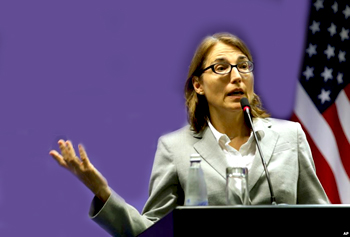New Delhi, Jan 14: A senior US official on Wednesday lauded the protests by authors and artistes against the murder of rationalist and Kannada scholar M M Kalburgi and cited the instance of the lynching of Mohammad Akhlaq at Dadri in Uttar Pradesh to drive home the point that silence could embolden perpetrators of such crimes.
Delivering a lecture at Vivekananda International Foundation in New Delhi, Sarah B Sewall, US Under Secretary of State for Civilian Security, Democracy and Human Rights, noted that the governments around the world must ensure that all people had the freedom to peacefully speak, organise and worship.
“But,” she added, “ensuring these freedoms calls for more than just enforcing laws, it means proactively speaking out – as both public officials and private citizens – to challenge calls for hatred and violence. Silence can embolden the criminal and the cruel – as in the lynching of a Muslim man last September or the burning of churches in Odisha.” Akhlaq was lynched by a mob at Bisara village near Dadri in Uttar Pradesh on September 28 after it was rumoured that he and his family had killed a cow and consumed beef on the occasion of Eid-ul-Adha. She also referred to the murder of Kalburgi at Dharwad in Karnataka on August 30 last and noted that he was the third rationalist to be murdered in recent years.
“When extremists murdered Malleshappa Kalburgi last August to silence his critical views – the third such murder in as many years – the Indian literary and artistic community was among the first to condemn the act,” said Sewall, who is currently on a tour of India. She was obviously referring to the killing of Narendra Dabholkar and Govind Pansare – at Pune in August 2013 and Kolhapur in Maharashtra in February 2015, respectively.
Over 30 authors returned their Sahitya Akademi award in September and October last year to protest the killing of Kalburgi, Dabholkar and Pansare as well as the lynching of Akhlaq. Several other artistes too returned their awards to protest what they perceived as “growing intolerance” in the country.“These examples of family and community-level interventions may help explain why so few Indians have joined ISIL’s (Islamic State) ranks thus far. But that is not reason for complacency; it is a call to give local leaders a greater role in pushing back against violent extremism in their communities,” said the US diplomat. “Governments can help by ending stifling regulations and allowing citizen groups to peacefully speak and organise around sensitive topics,” she said.
“Learning from the past, we must avoid the trap of invoking security to justify bigotry, profiling, and discrimination against any religious or ethnic group – including our Muslim brothers and sisters.”







Comments
NO, THEY WILL OFFER SOME BEEF BURGER AND WINE TO KEEP QUITE !
Now she spoke about intolarence in india... Will our BJP leaders will condemn this??? Lets wait and see
Add new comment